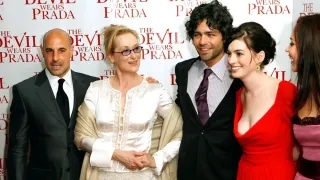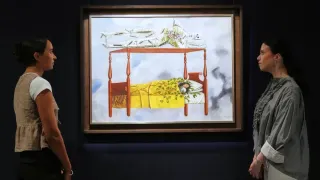
7 hours ago
Kristin Chenoweth Addresses Backlash After Charlie Kirk Tribute: It "Hurt Me So Badly"
READ TIME: 4 MIN.
Kristin Chenoweth, celebrated for her powerful performances on stage and her long-standing advocacy for LGBTQ+ rights, found herself at the heart of a social media controversy this week. The debate erupted after Chenoweth paid tribute to Charlie Kirk, a prominent conservative activist who died at 31 following a shooting at an event in Utah. Kirk, cofounder of Turning Point USA, was known for his vocal opposition to same-sex marriage and transgender rights—a stance that has frequently placed him in direct conflict with the LGBTQ+ community .
In an interview with NY1’s Frank DiLella, Chenoweth addressed the “mixed reactions” to her tribute. DiLella highlighted the tension between her large LGBTQ+ fan base and Kirk’s record on LGBTQ+ issues. Responding, Chenoweth grew emotional, stating, “I saw what happened online with my own eyes and I had a human moment of reflection right then… I came to understand that my comment hurt some folks and that hurt me so badly. I would never. It's no secret that I'm a Christian, that I'm a person of faith. It's also no secret that I am an advocate for the LGBTQ+ community and for some, that doesn't go together. But for me, it always has and it always will” .
Chenoweth’s tribute, which appeared in the comments of a Turning Point USA Instagram post, read, “I'm. So. Upset. Didn't always agree but appreciated some perspectives. What a heartbreak. His young family. I know where he is now. Heaven. But still.” The message prompted immediate backlash, with many fans expressing disappointment that an LGBTQ+ ally would publicly mourn a figure whose rhetoric was often exclusionary and harmful to marginalized communities .
Chenoweth’s comments highlight a deep challenge faced by many public figures who straddle multiple, sometimes conflicting identities and communities. As an openly devout Christian and a vocal LGBTQ+ advocate, she has often spoken about reconciling her faith with her commitment to equality. In this case, the tension was brought into sharp relief by the death of Kirk—a polarizing figure who, despite his popularity in conservative circles, was widely criticized for promoting policies and rhetoric that many LGBTQ+ individuals and organizations have called discriminatory .
“I would never want to hurt anyone in the LGBTQ+ community or make them feel unseen,” Chenoweth stated during her interview, reaffirming her support for LGBTQ+ rights and inclusion .
Chenoweth was not alone in publicly acknowledging Kirk’s death. Other celebrities, including Chris Pratt, Josh Duhamel, and Rosie O’Donnell, also posted tributes or comments. However, the reaction was far from unanimous. Amanda Seyfried, for example, posted on Instagram, “You can't invite violence to the dinner table and be shocked when it starts eating,” which many interpreted as a pointed critique of Kirk’s role in escalating divisive rhetoric . Seyfried later clarified, “I don't want to add fuel to a fire. I just want to be able to give clarity to something so irresponsibly (but understandably) taken out of context… I can 'get angry about misogyny and racist rhetoric, and ALSO very much agree that Charlie Kirk's murder was absolutely disturbing in every way imaginable’” .
The polarized responses reflect a larger cultural debate about how—and whether—to publicly mourn individuals whose public actions or statements have caused harm, especially to marginalized communities. For many LGBTQ+ people, Kirk’s death was not simply a personal tragedy, but a flashpoint for renewed discussions about the impact of political rhetoric and the responsibilities of public figures .
Charlie Kirk, best known as the cofounder of Turning Point USA, was a frequent critic of LGBTQ+ rights in the public sphere. His organization often promoted policies and viewpoints that sought to curtail the rights of same-sex couples and transgender people, and he publicly aligned himself with politicians and public figures who have opposed marriage equality and protections for LGBTQ+ youth .
LGBTQ+ leaders and organizations have consistently challenged Kirk’s statements and activism. Many see the normalization of anti-LGBTQ+ rhetoric in mainstream discourse as a direct contributor to discrimination and violence faced by LGBTQ+ people .
The aftermath of Kirk’s death and the ensuing debate over public mourning have sparked important conversations within the LGBTQ+ community about the boundaries of compassion, forgiveness, and accountability. While some advocate for separating personal grief from political legacies, others emphasize the need for continued vigilance against rhetoric that undermines LGBTQ+ rights and safety.
For many LGBTQ+ individuals, Chenoweth’s response—emphasizing both her faith and her advocacy—was a reminder of the complex intersections that define public life. Her willingness to acknowledge the hurt caused, and to reaffirm her support for LGBTQ+ people, was welcomed by some as a necessary step toward healing, though others remain wary of what they see as the normalization of anti-LGBTQ+ figures in mainstream culture .
As the LGBTQ+ community continues to navigate these difficult conversations, Chenoweth’s experience serves as a microcosm of the broader struggle for inclusion, respect, and authentic allyship in a polarized world.






